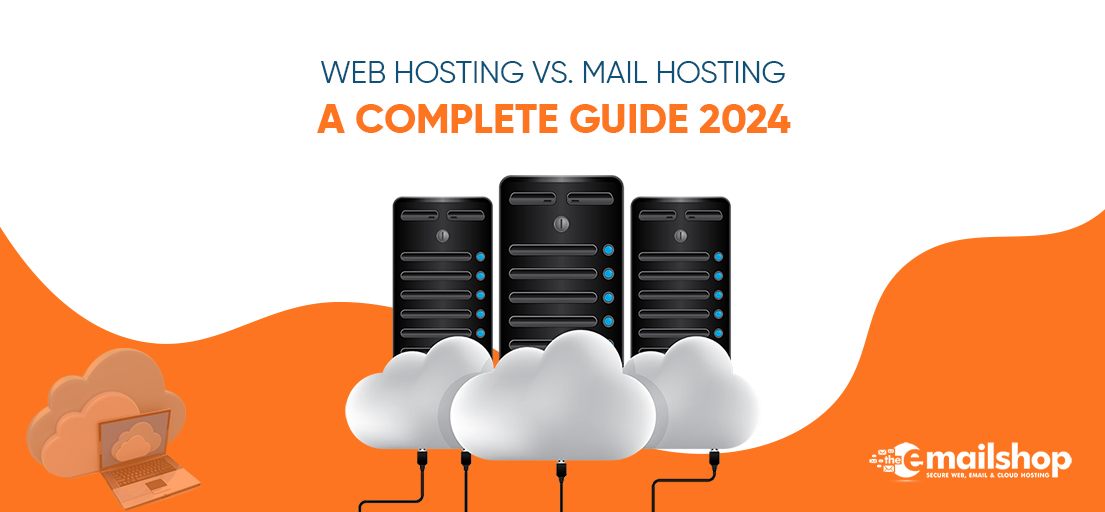Web hosting and email hosting are two distinct services, with the former being required for people and businesses wishing to host a website and the latter being the ideal option for those looking to host email addresses. Still, it might be difficult to determine which hosting is best for your purposes and select a provider with so many options, each offering a different plan. In this article we’ll go over the major distinctions between web hosting and email hosting, as well as the ideal uses for each and how to choose the correct service. So, if you want to discover more, continue reading!
What is Web Hosting?
Website hosting is an all-in-one service that combines all of the capabilities required to run an online project or business. This includes domain management, file management, email solutions, e-commerce, security software, and many more options. Web hosting providers want to be a one-stop shop for clients, offering as many connected services as feasible.
Types of Web Hosting
There are several types of web hosting, each catering to different needs and preferences. Here are some common types.
-
Shared Hosting
Multiple websites share resources on a single server. Cost-effective but may have limitations on resources and performance.
-
Virtual Private Server (VPS) Hosting
A virtualized server environment where multiple VPS instances share one physical server.Provides more dedicated resources compared to shared hosting, offering better performance.
-
Cloud Hosting
Website resources are spread across multiple virtual servers in a network (cloud). Offers scalability, flexibility, and high availability, as resources can be adjusted dynamically.
-
Reseller Hosting
Allows individuals or businesses to resell hosting services to their clients. Resellers manage their customer accounts and often use a shared hosting infrastructure.
-
Managed Hosting
The hosting provider handles server management, maintenance, and technical aspects.
Ideal for users who want a hands-off approach to server administration.
Purpose and Features of Web Hosting
Web hosting serves as the foundational infrastructure for making websites accessible on the internet. Its primary purpose is to store and deliver website content, ensuring it’s available for users whenever they visit. Key features of web hosting include.
-
Website Storage
Web hosting provides servers to store website files, including HTML, CSS, images, and multimedia elements. Ensures efficient organization and retrieval of website data.
-
Domain Management
Allows users to associate their domain names with specific servers, ensuring that visitors can reach their websites using the designated domain. Central to establishing a unique and branded online identity.
-
Server Resources
Allocates computing resources (CPU, RAM, disk space) necessary for processing and delivering website content. The type of hosting (shared, VPS, dedicated, or cloud) determines the extent of these resources.
-
Uptime and Accessibility
Reliable web hosting ensures that websites are accessible 24/7, minimizing downtime and providing a positive user experience. High uptime is crucial for maintaining online visibility and credibility.
-
Scalability
Offers the flexibility to scale resources based on the website’s needs, accommodating growth or fluctuations in web traffic.
What is Email Hosting?
Email hosting is sold separately from web hosting services for businesses that require a dedicated email server solution with support for bespoke domains, addresses, and inboxes. This form of hosting offers message sending and receiving using the POP3, IMAP, and SMTP standards. Each standard allows you to connect using SSL encryption for data protection.
Types of Email Hosting
There are several types of email hosting services available to cater to different needs and preferences. Here are some common types.
-
Free Email Hosting
Offered by various providers with basic features and is usually ad-supported. Examples include Gmail, Yahoo Mail, and Outlook.com.
-
Shared Email Hosting
Multiple users or businesses share the same email server. Cost-effective but may have limitations on resources.
-
Dedicated Email Hosting
Provides a dedicated email server for a single user or organization.Offers greater control, customization, and performance.
-
Cloud-based Email Hosting
Emails are hosted on a cloud infrastructure with resources distributed across multiple servers. Offers scalability, flexibility, and high availability.
-
Managed Email Hosting
The hosting provider manages the technical aspects of email hosting, including server maintenance and security. Ideal for users who prefer a hands-off approach.
-
Self-Hosted Email Servers
Organizations host their email servers on their infrastructure. Offers maximum control but requires technical expertise for setup and maintenance.
Purpose and Features of Email Hosting
Email hosting serves as a specialized service designed for managing and facilitating email communication. Its primary purpose is to handle email accounts, providing storage, security, and accessibility. Key features of email hosting include:
-
Custom Domain Emails
Enables the creation of email addresses using a custom domain (e.g., yourname@yourdomain.com), enhancing professionalism and branding.
-
Email Storage
Provides dedicated storage space for emails, attachments, and other communication data. Ensures efficient organization and retrieval of email content.
-
Collaboration Tools
Offers tools for collaboration, such as shared calendars, contacts, and tasks, fostering teamwork and coordination.
-
Security Protocols
Implements security measures to protect emails from spam, viruses, and other cyber threats. Common security features include spam filters, antivirus scanning, and encryption.
-
Accessibility and Mobility
Allows users to access their emails from any device with an internet connection, promoting flexibility and mobility.Supports synchronization across multiple devices.
-
Scalability
Provides the flexibility to add or remove email accounts based on organizational needs, accommodating growth or changes in staff.
-
Backup and Recovery
Offers regular backups of email data, ensuring recovery in case of accidental deletion, hardware failure, or other issues.
Importance of Hosting Services
- Hosting services are essential for building and sustaining a strong online presence. They provide the foundation for websites, applications, and digital material, making them accessible at all times. Individuals and corporations can efficiently store and manage data with hosting, which includes solutions for files, databases, and more.
- Domain management is streamlined, allowing for the association of unique domain names with specific servers, a key element in creating a distinctive online identity. Additionally, hosting services contribute to the performance and speed of websites, impacting user satisfaction and search engine rankings.
- Custom domain email addresses, facilitated by email hosting services, enhance professionalism in communication. Scalability options cater to evolving needs, making hosting adaptable for businesses experiencing growth or fluctuating web traffic. Security measures implemented by hosting providers protect against cyber threats, ensuring the safety of websites and data.
- Technical support is a valuable component, offering assistance in troubleshooting, maintenance, and optimizations. E-commerce operations rely on hosting for secure transactions and customer data management.
- Backup and recovery solutions provided by hosting services safeguard against data loss, contributing to the overall reliability and resilience of online platforms. In essence, hosting services are integral to the seamless functioning, security, and growth of digital endeavors.
The Key Differences Between Web Hosting and Email Hosting
With the broad definitions of web hosting and email hosting explained you should be able to tell the difference between the two. But if you need a few more clues, here are 5 characteristics you should look for when determining whether a provider offers web or email hosting.
- Content type saved Website files and material. Email messages and data.
- Basic features.Website storage capacity and bandwidth email addresses and email server software.
- Plans and Pricing(Typically) Plans vary in storage and bandwidth limits, as well as features. A variety of options with varied storage and email account restrictions.
- Management is handled by the web hosting provider. Depending on the desired level of service and control, either the user or the supplier can manage it.
- Importance Important for the functionality, dependability, and security of a website.Important for the security and access to email accounts and communications.
Read More: Email Marketing Trends To Boost Your Strategy in 2024
Conclusion
Email and web hosting differ technically in that they handle HTTP(S) queries, employ custom DNS records for the mail server, and allow you to run scripts or databases. Many firms want to manage domain mail separately from their site code. Make cybersecurity a top concern for your company by choosing a dedicated web host for business email requirements at the organizational level to ensure compliance.
All The Email Shop plans include pre-installed and fully integrated email servers supporting multiple users and inboxes. You can contact the Email Shop Team for more questions and assistance in choosing the best plan for you.
For Discount and Offers, Visit our Official Twitter Page









